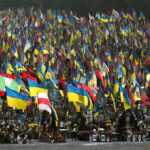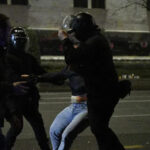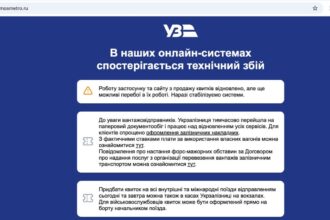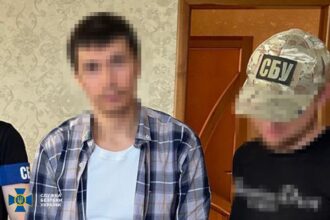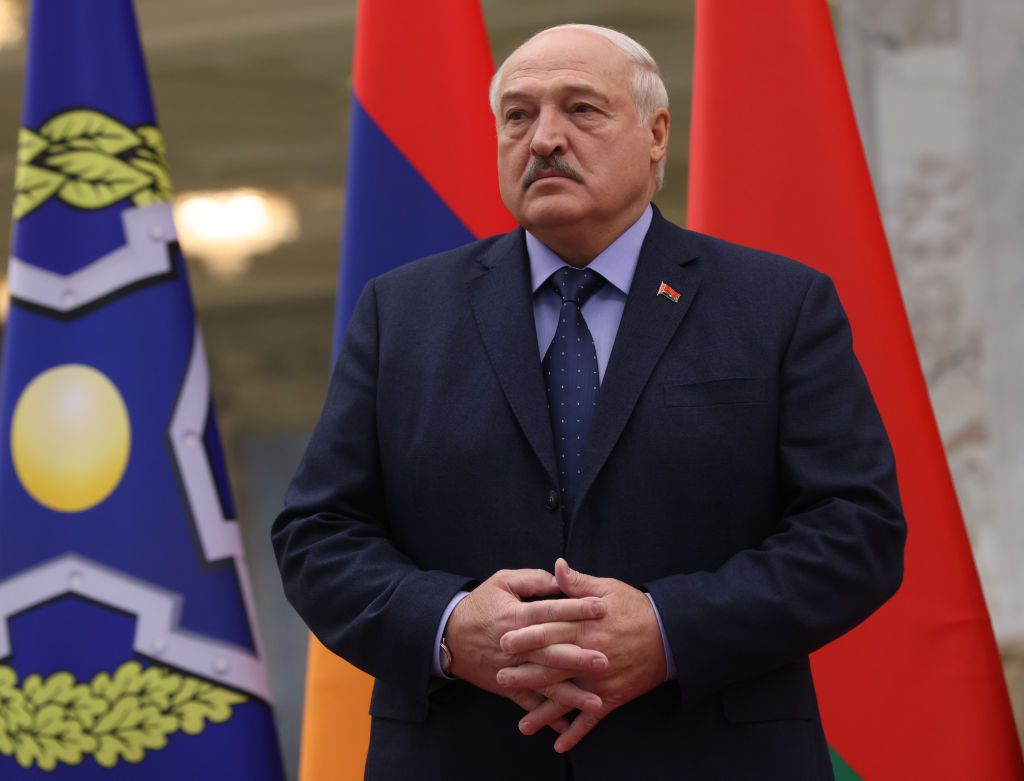Belarus has completed registration for the presidential election of 2025, allowing six “challenging” the dictator Alexander Lukashenko on the ballot.
Viasna, a human rights group, reports that Belarusian law enforcement officers conduct sweep raids ahead of the upcoming elections.
Peter Szijjarto, the Hungarian foreign minister, argues against sanctions and engages with Belarus and Russia at the Eurasian Security Conference held in Minsk.
After a year-long detention due to Belarus’s request for extradition, Serbia releases Belarusian activist Andrei Hniot.
Human rights group Viasna reports that a seventh political prisoner has died in custody in Belarus.
Belarus Election Committee approves six pro-Lukashenko candidate to ‘challenge him’ in 2025 Presidential Election
The Belarusian Central Election Committee has completed the registration of people who will be allowed to participate in the upcoming presidential election scheduled for January 26, 2025.
Six candidates allied to the regime were allowed to collect signatures in order to run against Alexander Lukashenko, the country’s dictator.
Lukashenko seeks a seventh consecutive term after four years of brutal crackdowns against civil society. These included the elimination of 1,700 non-profit organisations, the outlawing of all but four loyal political parties, and the imprisonments Lukashenko’s main political rivals, along with approximately 1,300 people now considered political prisoners.
The CEC registered nomination groups for Anna Kanapatskaya – a spoiler candidate in the 2020 presidential race – Siarhei Robertkau – the chairman of the Belarusian Union of Officers – and Siarhei Srankou — the leader of Communist Party of Belarus.
The previous registered initiatives were those of Lukashenko, Aleh Haidukevich (leader of the pro-Lukashenko Liberal Democratic Party), Alexander Hizhnyak (leader of the Republican Party), and Olga Chemodanova, a former spokesperson of the Interior Ministry.
Lukashenko said that he believes the nomination of his supporters is dictated by a desire to “secure him”.
“I’m certain they want to flank me, just to keep me safe. Nothing more, nothing less.” Lukashenko said, “I would like it to be that way.”
RFE/RL’s political analyst Valer Karbalevich said that “the nominations of several candidates apart from Lukashenko are designed to create an illusion that the current campaign will be no different than the previous campaign.”
Since 1994, when Lukashenko took power, Belarus has not had free or fair elections. The Belarusian regime heavily relied on Russia’s assistance to quell unrest in the country during mass protests of 2020.
Independent election observers have said that they will attempt to monitor the “election”‘s conduct from afar. The Belarusian Helsinki Committee, Human Rights Center Viasna and the Belarusian Helsinki Committee have launched a campaign called “Human Rights Activists for Free Elections”, which will monitor elections using publicly available sources if independent observation on site is not possible.
In its first election report, the campaign stated that “conducting a free-and-open election campaign is impossible when there is political terror.”
Sviatlana Haauniova, the lawyer for the campaign, says that “it seems the only role of the registered candidates is to demonstrate formally the presence of an alternate in the 2025 election, but not overshadow the primary candidate or even to create the illusion of a competition.”
The registered initiative groups must collect over 100,000 signatures by Dec. 6 in order to be eligible to run.
Belsat, a news outlet backed by Poland, reports that the process of collecting signatures will take place at a time where repression still haunts people who signed up for alternative candidates in 2020. Employees of government agencies, banks and military enterprises as well as plants were fired because they supported Lukashenko’s rivals.
Pavel Sapelka, from Viasna, told Belsat that the process is so invisible it’s impossible to evaluate. “We are aware of the phenomenon but cannot estimate its size,” he said.
Sviatlana Sikhanouskaya – an exiled opposition leader who claimed to beat Lukashenko at the 2020 presidential elections – denounced the elections, calling them “imitation” or “non elections”. Her office urged supporters to vote against all to protest the rigged election.
Other voices within the exiled opposition called for a boycott or for consolidated voting in favor of one of the spoiler candidate. Political analyst Artsiom Schraibman says that without a fair count of votes, it would be difficult to prove the effectiveness of either strategy.
Viasna reports that Belarusian authorities have launched countywide raids in advance of the presidential elections.
Human Rights Group Viasna said that Belarusian law enforcement launched massive raids across the country starting October 31. The arrests and searches are part of an “intimidation campaign” before the elections.
Viasna reports the Belarusian KGB detained dozens in the capital Minsk and in the oblast centres of Homiel, Mahiliou as well as regional towns across the country, under the pretext that they were investigating an alleged “conspiracy” to seize the power.
“Human Rights Defenders know that there are detentions all over Belarus.” They look like an act of intimidation planned before the elections,” Viasna stated on its official Telegram Channel.
According to the BYSOL initiative, which helps Belarusians in exile, at least 80 people have been targeted so far in the raids.
“Accordingly to our data, Minsk’s isolation center located on Okrestina Street is overcrowded.” BYSOL told Zerkalo that there are 16 people in each cell, which is designed for 3-4 people.
Some of the first detained are still in custody while others have been released after they were declared witnesses in court cases. The criminal code stipulates that those convicted of conspiring for power seize must serve a minimum eight years in prison.
Law enforcers often target those who have been previously detained for politically motivated administrative charges. Viasna reports that this number is over 36,000.
There have also been reports of brutal detentions and unjustified force being used.
Hungarian FM speaks against sanctions against Minsk during a Belarus security conference
At a Belarus security conference on October 31, the state-owned Belarus news agency Belta reported that Hungarian foreign minister Peter Szijjarto criticised European Union sanctions against Belarus, Russia and urged for cooperation rather than “burning bridges”.
The Minsk International Conference on Eurasian Security was expected to host 600 high-ranking officials from 45 countries, but the actual attendance was much lower. The conference was attended by Sergey Lavrov, Russian Foreign Minister and Bassam al-Sabbagh, Syrian Foreign Minister.
Szijjarto began his keynote speech in Russian by saying, “Let’s hope together that we won’t be judged because of this discussion.” The Hungarian Foreign Minister said that Hungary has the right to directly negotiate with anyone and that Budapest opposes sanctions against Russia and Belarus.
“We will not accept any restrictions regarding our cooperation partners.” Szijjarto stated that he disliked sanctions politics.
During the conference Szijjarto had talks with Russia’s Lavrov, and Belarus’s Maksim Ryzhankou.
“We Hungarians conclude if sanctions do not work, we should not engage in them and we shouldn’t impose” Szijjarto stated after talks with Ryzhankou in Minsk on October 31.
Szijjarto said that a greater cooperation with Belarus is in Hungary’s “national interests.”
Hungary, which holds the rotating EU presidency at the moment, is the only European country that has maintained ties with Lukashenko’s regime despite its crackdown on dissent, and its subsequent involvement in Russia’s war in Ukraine. Szijjarto visited Minsk in 2023 twice and in May 2024. The exiled Belarusian Opposition was not pleased.
Hungary is the most Kremlin friendly country in the EU. It has opposed Ukraine’s membership to NATO and EU, obstructed Russian sanctions, and undermined Western efforts for Ukraine.
Serbia releases Belarusian activist following a year-long detention
His lawyer announced on October 31 that Andrei Hniot was released. The Belarusian political and film director had been held in Serbia under threat of being extradited to Belarus for an entire year.
Hniot, a Belarusian citizen, was arrested in Serbia in October 2023 on charges of tax evasion. Hniot’s defense insists that the charges were political and retroactively issued, without any legal basis for the case. They also accused Minsk using Interpol’s “Red Notices” arrest warrants to harass exiled political dissidents.
According to Filip Sofijanic of RFE/RL, Hnyot’s lawyer in Belgrade told RFE/RL that the Higher Court in Belgrade waived Hniot’s detention as the legal deadline had expired on October 31.
The activist was not subjected to new restrictions, and was able to leave Serbia and travel to Germany.
Maria Kolesava Hudzilina, former president of the Belarusian Association of Human Rights Lawyers and a member of Hniot’s legal team, says that the extradition case has not been closed despite Hniot’s safe departure to an EU member state.
“This (extradition procedure) may continue for a very long time as it does not have a statute of limitations – it can be one year or ten years,” Kolesava Hudzilina said. She highlighted that the Belarusian activists still risk extradition in other nations.
Interpol temporarily blocked the director’s data from its database on February 27, but the Belarusian government continues its case against him. Belarus authorities added Hniot’s Instagram page to their list of “extremist material” on the day after his release.
Human rights groups and exiled Belarusian political opposition fought for Hniot’s release in this year. Hniot expressed his gratitude to the Belarusian opposition leaders Sviatlana Sikhanouskaya, Pavel Latushka and German officials including Chancellor Olaf Scholz, Deputy German Ambassador in Serbia Carsten Meyer Wiefhausen and others at a press conference held on Nov. 2.
Hniot had to endure several rounds of approval for deportation and reversed decisions from December 2023 to August 2024. The Appeal Court of Belgrade, the highest court in the legal process, found the Higher Court’s decision to extradite Hniot was “based on incomplete facts, which resulted in a significant violation” of criminal procedure rules and ordered a new trial.
Hniot served five months in a Serbian prison and seven additional months under house arrest.
Hniot, along with thousands others, participated in a widespread protest against the results of the Belarusian Presidential Elections that were widely condemned as neither fair nor free. He founded the Belarusian Free Association of Athletes which was later branded an extremist group by the Belarusian Government.
Viasna : Seventh political detainee dies in custody
Human Rights Center Viasna announced on Nov. 1 that a 22-year old political prisoner, who was serving a 12-year sentence for “espionage,” and “aiding in extremist activities,” had died in custody.
Dmitry Shletgauer, a Russian-born political detainee, is the seventh jailed opponent of Belarusian dictator Alexander Lukashenko to die in prison after the crackdown against Belarusian civil societies that began in 2020 following mass protests. Over 6,000 Belarusians have been criminally persecuted following fraudulent presidential elections and nationwide protests. Currently, 1,300 people are being held behind bars for politically motivated charges.
Shletgauer was sentenced to 12 years in prison for alleged espionage, facilitation of extremist activity and facilitation. The verdict came after a closed-door trial earlier this year. Human rights defenders are unaware of the evidence in this case.
Shletgauer died on October 11, one month after he was transferred to Mahiliou penal colonies No. Viasna reported that Shletgauer was supposed to finish his sentence at Mahiliou penal colony No. 15. The cause of death has not been disclosed by the authorities. Shletgauer’s family confirmed the death of Shletgauer to independent news outlet Zerkalo without providing any further details.
Political prisoners are held in Belarus in harsh conditions. They are denied medical care and are subjected arbitrary punishments, as well as debilitating forced labour in penal colonies. Vitold Ashurak and prominent artist Ales Pullkin, blogger Mikalai Klimovic and activists Ihar, Vadzim, and Aliaksandr Kulinich are among those who have died in custody.
Belarusian opposition has compiled a list of “humanitarian” political prisoners with severe medical conditions who may not survive their prison time.
Belarusian authorities, however, have paid little attention when pardoning political prisoners to the opposition’s list of humanitarian releases. Most of the 115 individuals who were released in four recent pardon rounds were not on the list.
Maria Yeryoma, a Belarusian media manager, is a contributing writer at the Kyiv Independent. She was recently the director of commercial “special projects”, at TUT.BY, the largest independent online media outlet in the country. In May 2021, TUT.BY’s offices were raided by Belarusian authorities. 15 employees were taken into custody and the team was forced to leave the country in order to continue working. Maria moved to Kyiv, where she helped establish a new media outlet called Zerkalo.
Read More @ kyivindependent.com





